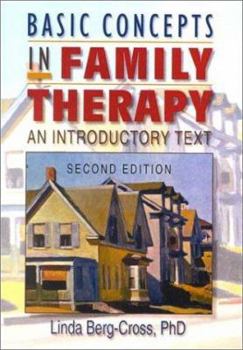Basic Concepts in Family Therapy: An Introductory Text, Second Edition
Select Format
Select Condition 
Book Overview
This new edition of Basic Concepts in Family Therapy features current research and added materials in each chapter. For family therapists and students, especially those challenged by child or adolescent problems in the family context, this intelligent guide will assist you in handling specialized situations through newly added chapters on resiliency and poverty, adoption, chronic illness, spirituality and religion, and parenting strategies. Basic Concepts in Family Therapy will help you bridge theories and techniques with problems you see everyday in society to offer improved and relevant services to clients.
Format:Paperback
Language:English
ISBN:0789009412
ISBN13:9780789009418
Release Date:April 2000
Publisher:Routledge
Length:642 Pages
Weight:2.05 lbs.
Dimensions:1.4" x 6.1" x 9.1"
Customer Reviews
4 ratings
Basic Concepts in Family Therapy
Published by Thriftbooks.com User , 16 years ago
Had bought this book for a class in group and couples therapy; though I have only read a few assigned chapters at this point, it is well=written, easily understandable, and has excellent examples. I'm looking forward to finishing the book. It is not a stuffy, textbook-like tome, but an informative and enlightening book.
Basic concepts in family therapy
Published by Thriftbooks.com User , 25 years ago
This is an excellent book, well researched with up-to-date references and written with numerous case stories to illustrate the point in every relevant chapter. Linda Berg-Cross is affiliated with Howard University in Washington, DC, but also active in private practice working with individuals, families and groups with a another textbook on Couple Therapy to her name. This book is devided into six units: Getting acquinted with the family; Systems perspective on family concepts; Ecological stressors; A cognitive perspective on family concepts; A sibling perspective and A social psychological perspective with a total of 22 chapters. I especially liked the two chapters on "Family resiliency and poverty" and the last chapter on "Spirituality", both new additions to this second textbook edition. In the chapter on resiliency it is stressed that self-efficacy versus dependence and growth versus stagnation are two important issues in working with families living in poverty. Four models are discussed: The moral model, where the individual is responsible for his own problems and their solutions; the enlightenment model suggests that the individual is responsible for his problems, but the solution must be given oor told (to enlighten) from an outside source; the medical model sees the problem as a disease, where the individual has little power over the cause or the cure and the compensatory model that takes the position that the individual must compensate for the deficits imposed and overcome the barriers. It is very essential to realize that the solutions are not outside the client, but within and the function of the therapist is to assist the client to remove the stressors and unveil the family unit as resourceful and capable of solving their problems. The chapter on spirituality is interesting, because it is a subject that many professionals often shy away from, but nevertheless important for many families (40% of all Americans attend a place of worship at least weekly and 90% of all American adults say the pray to God at least occasionally). In fact spirituality and religion have many overlapping roles and functions together with family therapy like: to foster a sense of perspective, to give meaning to life, to provide rituals that transform and connect, to provide social support networks, to structure society and set ethical norms, to give an identity and heritage to family members, to support families, to facilitate posie change in individuals, to look out for the physical and emotional welfare of family members and finally to educate family members. All in all a book for therapists, students and people interested in the dynamics of family life. All will get something out of reading it.Professor Joav Merrick, MD, DMSc Medical Director, Division for Mental Retardation, Box 1260, IL-91012 Jerusalem, Israel. E-mail: jmerrick@aquanet.co.il
An excellent survey of family therapy issues.
Published by Thriftbooks.com User , 25 years ago
Any collection strong in psychology or family therapy at the college level will find this newly revised and expanded edition of Basic Concepts In Family Therapy essential, providing over twenty basic psychological concepts therapists may use to understand and help clients. From poverty to family productivity, this provides an excellent survey of family therapy issues.
Basic Concepts in Family Therapy: An Introductory Text
Published by Thriftbooks.com User , 25 years ago
Good overview of treatment considerations associated with family intervention. Some areas would benefit from updating, otherwise pretty sound. A respectable introductory text.





